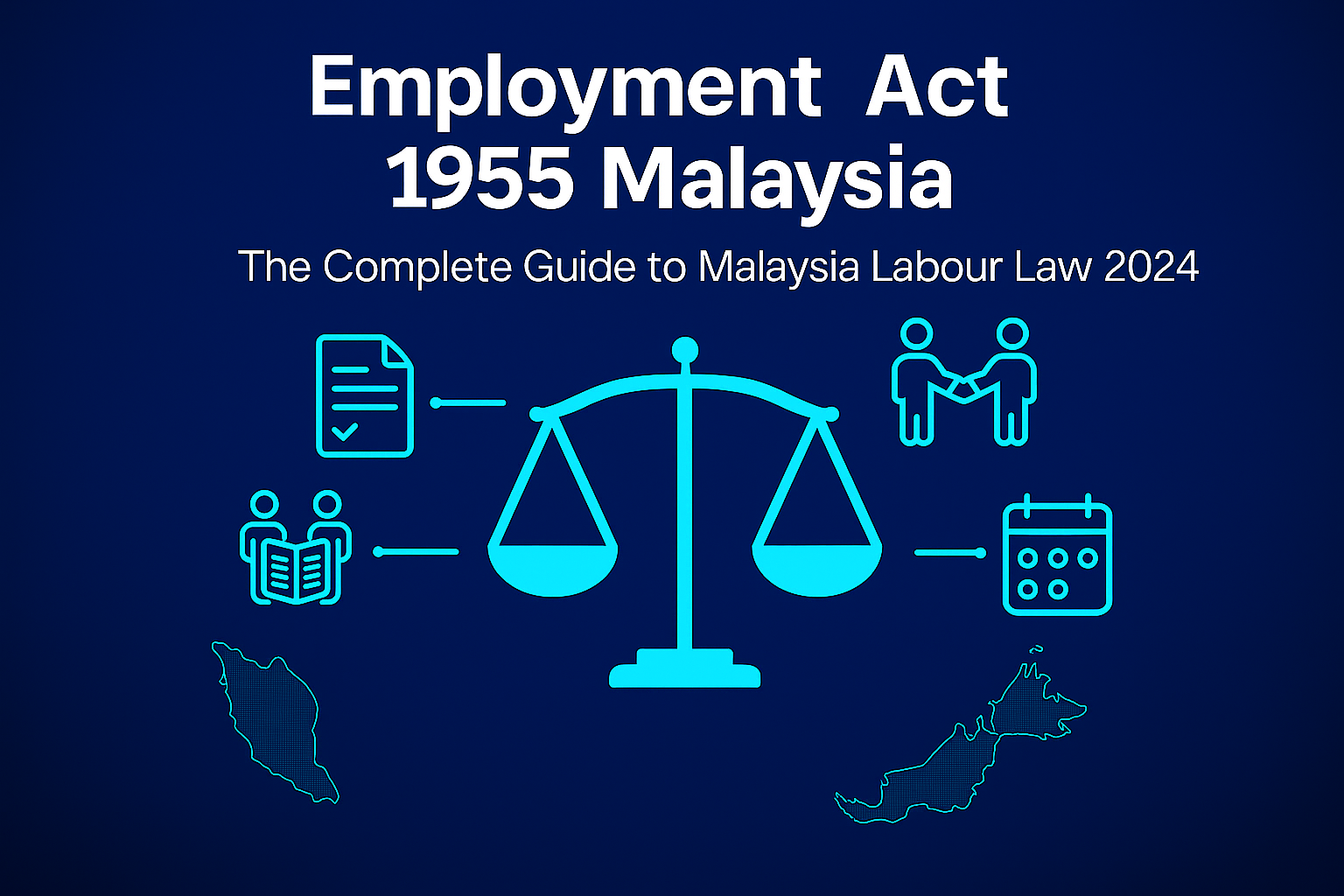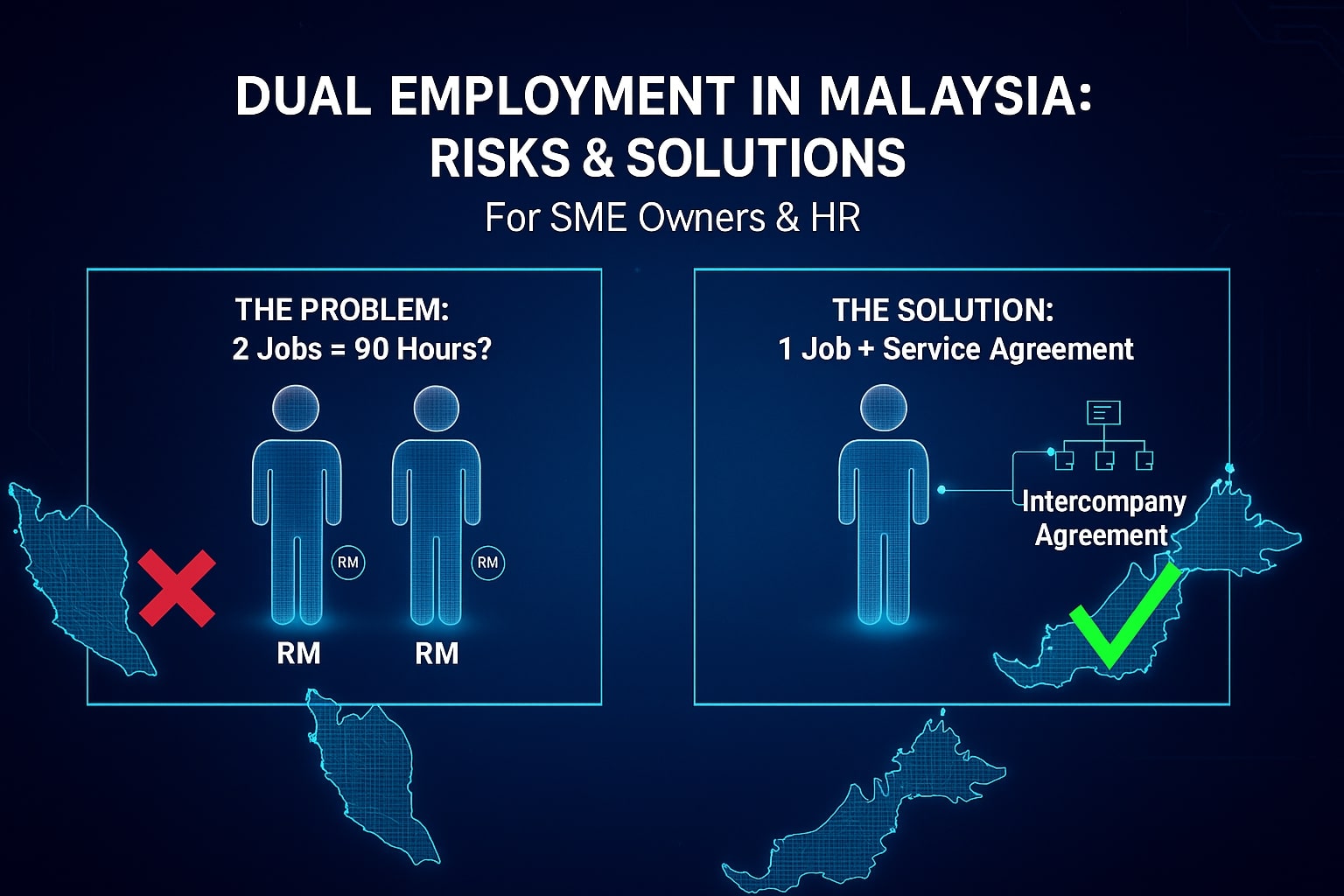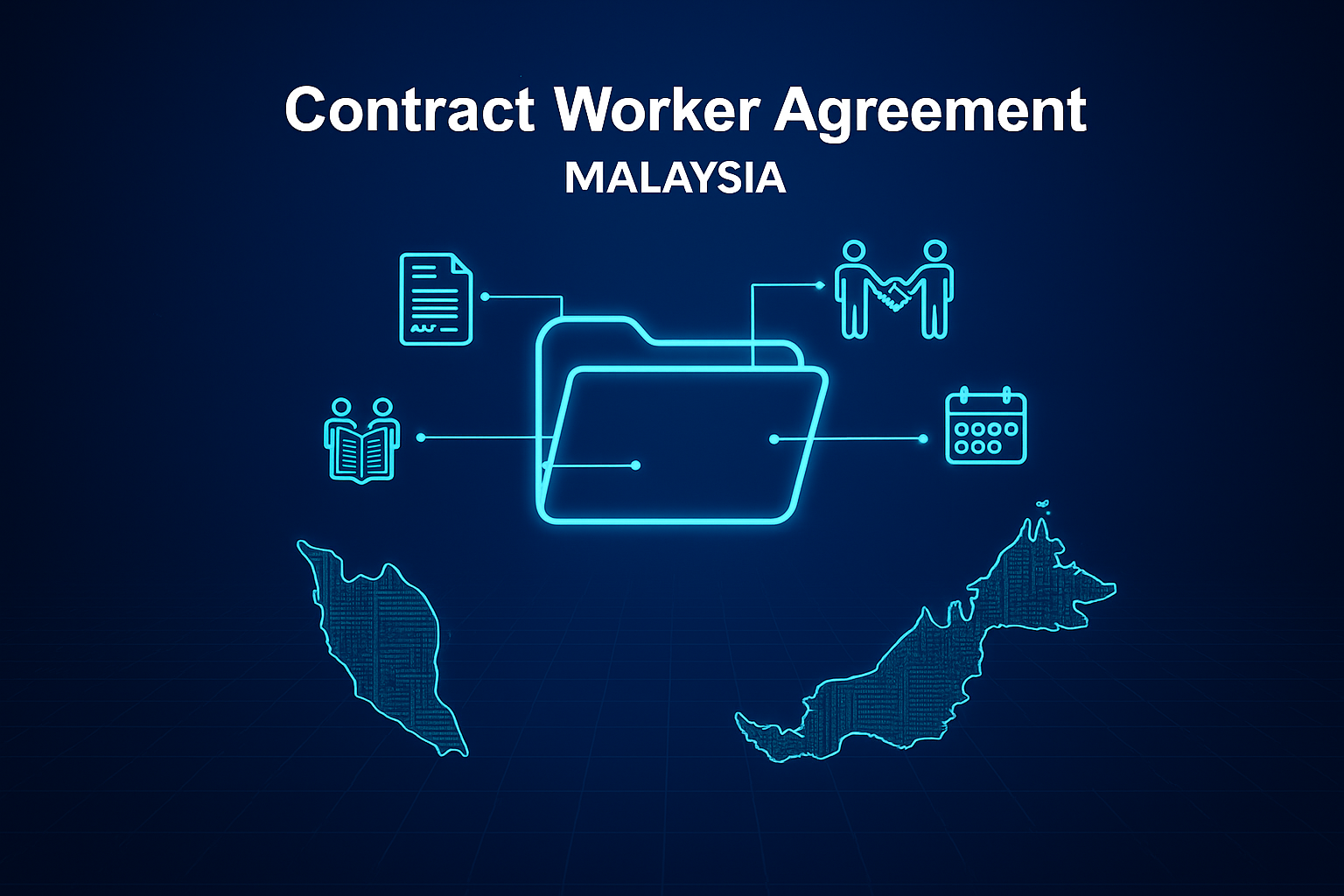Employment Act 1955 Malaysia — The Complete Guide to Malaysia Labour Law 2024
A simplified guide to Malaysia’s Employment Act 1955 — covering employee rights, employer obligations, working hours, leave entitlements, termination rules, and key updates every SME should know.

Introduction: What Is the Employment Act 1955?
The Employment Act 1955 is Malaysia’s main piece of labour legislation, regulating the relationship between employers and employees in Peninsular Malaysia and Labuan.
It sets the minimum standards of employment, including wages, working hours, leave, benefits, and termination rights.
This law ensures that employees are treated fairly and that employers follow standard labour practices that align with Malaysia’s labour policy and international standards.
In simple terms: The Employment Act 1955 = Malaysia’s foundation for fair employment and HR compliance.

The Purpose of the Employment Act 1955
The main goal of the Employment Act 1955 is to protect workers’ rights and provide a legal framework for employment relationships.
It aims to ensure fairness, transparency, and harmony between employers and employees.
Define employee rights and employer duties.
It outlines what employers must provide (e.g. wages, rest days, leave) and what employees are entitled to.
Prevent exploitation and unfair treatment.
It ensures employees receive fair pay and safe working conditions.
Standardize employment practices.
The Act provides uniform standards for employment across Malaysia.
Support social and economic stability.
A fair labour system helps maintain a productive and equitable workforce.
The Employment Act provides the “minimum floor” of protection — companies can offer more benefits, but not less.
Why Do We Need the Employment Act?
Before the Act, everything depended on “trust” and individual contracts. That easily leads to abuse and disputes.
The Employment Act exists to:
- Protect basic rights: so employees are not underpaid, overworked, or unfairly dismissed.
- Give clear rules: so employers know the minimum standards and don’t accidentally break the law.
- Create a level playing field: so companies compete on productivity and service, not on who can exploit staff the most.
The Act as a Minimum “Floor”: Sections 7, 7A & 7B
These three sections are the “philosophy” of the Act:
- Section 7: If your employment contract gives less than what the Act says, that clause is void. The Act’s standard replaces it.
- Section 7A: You can give better benefits. The Act is a floor, not a ceiling.
- Section 7B: If the Act is silent on something (e.g. bonus structure), you can decide by contract.
Where Does the Act Apply, and Who Is Covered?
Geographic Scope: Section 1
The Employment Act 1955 applies to:
- Peninsular Malaysia
- Federal Territory of Labuan (by extension order).
It does not apply in Sabah and Sarawak – those are covered by the Labour Ordinance (Sabah Cap. 67) and Labour Ordinance (Sarawak Cap. 76) instead.
If your SME has branches in both KL and Kota Kinabalu, you are dealing with different laws.
Who Is an “Employee”? Section 2 & First Schedule
After the 2022 amendments, the Act now covers all employees under a “contract of service”, regardless of salary. The First Schedule now says: “1. Any person who has entered into a contract of service.”
Exceptions: Employees Earning More Than RM4,000
If an employee earns more than RM4,000/month, the following sections do not apply to them unless they fall into certain special categories (manual workers etc.):
- Section 60(3): Overtime for work on rest days
- Section 60A(3): Overtime for work in excess of normal hours
- Section 60C(2A): Shift work allowance
- Section 60D(3) & (4): Extra pay for work on public holidays
- Section 60J: Statutory termination, lay-off and retirement benefits
Practical meaning for SMEs:
A manager on RM6,000 is still covered by the Act for maternity, paternity, discrimination, sexual harassment, etc.
But their overtime, rest day pay, PH pay and termination benefits are based on contract, not those sections of the Act (unless they are manual workers, drivers, etc.).
Who Is Not Fully Covered? Domestic Employees & Others
The Act also treats domestic employees differently under the First Schedule, paragraph 2(5):
“He is engaged as a domestic employee.”
For domestic employees (maid, live-in cleaner, etc.), the following do not apply:
- Sections 12, 14, 16, 22: notice of termination, misconduct procedures, etc.
- Sections 58A, 60, 60A, 60B, 60C, 60D, 60E, 60F, 60FA, 60I, 61, 64: rest days, hours of work, PH, annual leave, sick leave, paternity leave, etc.
- Parts IX and XIIA
So domestic employees do not enjoy many of the core protections of the Act, including maternity leave under Part IX.
SME takeaway:
Most SME staff (admin, sales, warehouse, drivers, technicians, etc.) are fully within the Act. Domestic employees and some higher earners are partially excluded from specific sections, not the whole law.

Key Areas Covered by the Employment Act 1955
The Act covers several major aspects of employment relationships, including:
Working Hours & Rest Days
- Maximum working hours: 45 hours per week.
- Minimum 1 rest day per week.
- Overtime rules and pay are clearly defined.
Wages & Payment
- Employers must pay wages no later than the 7th day after the wage period ends.
- Deductions are only allowed under lawful conditions (e.g. EPF, SOCSO, EIS, income tax).
Leave Entitlements
- Annual leave, sick leave, maternity leave (98 days), and paternity leave (7 days) are specified.
- Public holiday entitlements are guaranteed.
Flexible Working Arrangements (FWA)
- Employees can formally apply for flexible working hours, workdays, or work-from-home options under Sections 60P and 60Q.
Protection for Women & Maternity
- Prohibits dismissal of pregnant employees except for misconduct or business closure.
- Protects maternity rights and benefits.
Termination and lay-off benefits
- Requires written notice before termination.
- Provides compensation rights under specific conditions.
- Employers must have valid reasons for dismissal (e.g. misconduct, redundancy).
Prohibition of Forced Labour & Harassment
- Explicitly bans forced labour and sexual harassment.
- Employers must maintain a safe and respectful workplace.
HR Insight: Compliance isn’t just about avoiding penalties — it’s about maintaining fairness and a good employer brand.
Who Enforces the Employment Act 1955?
The Director General of Labour (DGL) under the Ministry of Human Resources (MOHR) is responsible for enforcing the Act.
The DGL has the authority to:
- Inspect workplaces for compliance.
- Investigate employee complaints.
- Issue orders or fines for violations.
- Mediate disputes between employers and employees.
Penalties for non-compliance can reach up to RM50,000 per offence.

Why the Employment Act Matters for Employers & HR
HR Perspective:
- It sets the minimum compliance standard every HR policy must follow.
- It helps HR professionals align internal policies with national law.
- It prevents labour disputes, penalties, and reputational damage.
Employer Benefits:
- Builds trust with employees.
- Improves retention through fair treatment.
- Protects businesses from legal risk.
When your HR policies align with the Employment Act, your company operates confidently within the law.
Why Is the Employment Act So Important for SMEs?
For SME owners, the Act is important because it:
- Reduces disputes – clear rules mean fewer arguments about “what is fair”.
- Prevents costly claims – non-compliance can lead to fines, back pay, and industrial court cases.
- Builds trust with staff – when employees know you follow the law, they are more loyal and productive.
- Supports digitisation & HR systems – payroll, overtime, leave, and HR software (like your accounting/HR system) must be configured based on EA 1955 rules.
Clerks handling HR/payroll should treat the Act as their daily reference manual.

Employment Contracts: Get It Right from Day One
Written Contract Requirement: Section 10
Under Section 10, a written contract of service is compulsory when:
- Employment is longer than 1 month
- The job will take more than 1 month to complete.
Tip: In practice, you should always issue written contracts. Verbal agreements = future headaches.
What Your Contract Should Cover (At Minimum)
Based on Sections 10–12, 18, 59, 60A, 60D, your contract should clearly state:
- Job title & brief job description
- Work location (and transfer clause if any)
- Wage rate and wage period (e.g. monthly) – Section 18
- Normal hours of work and any shift arrangements – Section 60A
- Rest days & public holidays – Sections 59 & 60D
- Overtime rules & rate (if applicable) – Sections 60A(3), 60D(3)
- Leave entitlements: annual, sick, maternity/paternity (where applicable) – Sections 60E, 60F, 37, 60FA
- Termination and notice period – Section 12
A good contract mirrors the Act or goes beyond it – never below.
Wages, Deductions & Payment Rules
Wage Period & Payday: Sections 18 & 19
- Wage period (Section 18): Cannot exceed one month.
- Payment deadline (Section 19): Wages must be paid no later than the 7th day after the last day of the wage period.
How Wages Must Be Paid: Sections 25 & 25A
Based on Sections 10–12, 18, 59, 60A, 60D, your contract should clearly state:
- By default, wages must be paid via a financial institution (bank transfer).
- Payment in cash or cheque is only allowed if:
The employee requests it in writing
The Director General approves.
Lawful Deductions: Section 24
You cannot simply deduct anything you like from wages. Section 24 allows only specific deductions, such as:
- Overpayment of wages (within the last 3 months)
- Indemnity for termination without notice (Section 13)
- Advances (without interest)
- Statutory deductions (EPF, SOCSO, EIS, PCB)
- Other deductions with employee’s written consent and, in some cases, Labour Department approval
In general, total deductions in a month cannot exceed 50% of that month’s wages.
SME tip: Always keep written proof for any non-statutory deduction. No “verbal only”.
Working Hours, Overtime & Leave (Part XII)
This is where SMEs most often get caught.Wage Period & Payday: Sections 18 & 19
Normal Hours of Work & Weekly Limit: Section 60A
Under the amended law:
- Maximum normal hours per day: 8 hours
- Employee cannot work more than 5 consecutive hours without at least a 30-minute break.
Overtime (Section 60A(3))
- Overtime is any time worked beyond normal hours.
- OT rate must be not less than 1.5x the hourly rate of pay.
Important:
For employees earning more than RM4,000/month, Section 60A(3) on overtime does not apply unless they fall under the special categories in the First Schedule (manual workers, drivers, etc.).
Rest Days: Sections 59 & 60
- Minimum one rest day per week (Section 59).
- Work on a rest day attracts premium pay under Section 60(3), but again, that section does not apply to those above RM4,000/month (unless they are non-exempt).
Public Holidays: Section 60D
Employees are entitled to 11 paid public holidays per year, 5 of which are compulsory:
- National Day
- Yang di-Pertuan Agong’s Birthday
- Ruler’s or Yang di-Pertua Negeri’s Birthday / FT Day
- Workers’ Day
- Malaysia Day
Work on a public holiday is subject to special rates under Section 60D(3) — typically at least double or triple the hourly rate (depending on whether it’s normal hours or overtime), or a substitute holiday.
Again, Section 60D(3) & (4) do not apply to those above RM4,000/month (unless non-exempt).
Annual Leave: Section 60E
Minimum annual leave per year of service:
- Less than 2 years: 8 days
- 2 years to <5 years: 12 days
- 5 years and above: 16 days
Sick Leave: Section 60F
Paid sick leave (with medical certificate) per year:
- <2 years’ service: 14 days
- 2–5 years: 18 days
- ≥5 years: 22 days
- With hospitalisation: Up to 60 days per year (in addition to the above), subject to the latest interpretation that the 60 days is no longer a total combined cap.
Maternity & Paternity Leave
Maternity Protection: Part IX, Sections 37, 41A & 42
Section 37 – Maternity Leave
- A female employee is entitled to 98 consecutive days of maternity leave for each confinement (subject to qualifying conditions).
Maternity Allowance
- Eligible employees are entitled to maternity allowance at their ordinary rate of pay during the 98 days, subject to the conditions in Section 37.

Job Protection (Sections 41A & 42)
- It is an offence to terminate a pregnant employee or one suffering illness related to pregnancy, except for:
Wilful breach of contract (Section 13(2))
Misconduct (Section 14(1))
Closure of business
- After the “eligible period”, you also cannot simply terminate her if she is medically certified unfit due to pregnancy-related illness (Section 42).
The burden of proof is on the employer to show termination is not based on pregnancy.
Paternity Leave: Section 60FA
The 2023 amendment introduced paternity leave:
- 7 consecutive days of paid paternity leave per confinement
- Limited to 5 confinements per employee (regardless of number of spouses)
Conditions:
- Employed by the same employer for at least 12 months immediately before the leave
- Has notified the employer of the pregnancy at least 30 days before expected confinement or as early as possible after the birth
Flexible Work, Discrimination & Sexual Harassment
Flexible Work Arrangements: Part XIIC, Sections 60P & 60Q
Employees can now apply for flexible work arrangements (working hours, days, or place of work).
- Application must be in writing (Section 60P).
- Employer must reply in writing within 60 days, stating:
Whether the application is approved
If rejected, reasons for rejection (Section 60Q).
Anti-Discrimination: Section 69F
Section 69F gives the Director General the power to inquire into and decide disputes relating to discrimination in employment (e.g., unfair treatment based on gender, religion, etc.). Failure to comply with his order can lead to a fine up to RM50,000, with RM1,000 per day for continuing offences.
Sexual Harassment: Part XVA (Sections 81A–81H)
Key points:
- Employers must inquire into any sexual harassment complaint (Sections 81B & 81C).
- Failure to do so is an offence, with fines up to RM50,000 (Section 81F).
- Employers must display a notice at the workplace to raise awareness on sexual harassment (Section 81H).
SME tip: Even small offices should have a simple written policy and reporting channel.
Foreign Employees: Part XIIB (Sections 60K, 60KA, 60M)
If your SME hires foreign workers:
- Section 60K – You must obtain prior approval from the Director General before employing a foreign employee and meet certain conditions (no outstanding offences, etc.).
- Section 60KA – Imposes further obligations on employers regarding the welfare and management of foreign employees.
- Section 60M – You cannot terminate a local employee just to replace them with a foreign employee.
Termination, Notice & Misconduct
Notice Periods: Section 12
Minimum notice periods under Section 12 (if not otherwise agreed by contract):
- <2 years’ service: 4 weeks
- 2–5 years: 6 weeks
- ≥5 years: 8 weeks
Termination Without Notice: Section 13
Under Section 13, either party can terminate the contract without notice by paying an indemnity in lieu of notice equal to the wages for the notice period.
Termination for Misconduct: Section 14
For dismissal due to misconduct (Section 14):
- Employer must conduct a due inquiry (domestic inquiry)
- Employee must be given a chance to be heard and defend himself
Skipping proper inquiry = very risky in industrial disputes.
Statutory Termination Benefits: Section 60J
Section 60J provides for statutory termination, lay-off and retirement benefits but does not apply to employees earning more than RM4,000/month (unless they fall under the special categories in the First Schedule).
Termination, Notice & Misconduct
Notice Periods: Section 12
Minimum notice periods under Section 12 (if not otherwise agreed by contract):
- <2 years’ service: 4 weeks
- 2–5 years: 6 weeks
- ≥5 years: 8 weeks
Termination Without Notice: Section 13
Under Section 13, either party can terminate the contract without notice by paying an indemnity in lieu of notice equal to the wages for the notice period.
Termination for Misconduct: Section 14
For dismissal due to misconduct (Section 14):
- Employer must conduct a due inquiry (domestic inquiry)
- Employee must be given a chance to be heard and defend himself
Skipping proper inquiry = very risky in industrial disputes.
Statutory Termination Benefits: Section 60J
Section 60J provides for statutory termination, lay-off and retirement benefits but does not apply to employees earning more than RM4,000/month (unless they fall under the special categories in the First Schedule).
Record-Keeping & Inspections
Registers & Records: Section 61
Employers must keep proper registers of employees and payments and preserve them for at least 6 years.Registers & Records: Section 61
Labour Inspections: Part XIV
Under Part XIV, labour officers have the power to:
- Enter premises
- Inspect records
- Question persons to ensure compliance
If your records are in order (or digitised properly), inspections are much less stressful.
Offences, Penalties & Forced Labour
Forced Labour: Section 90B
Section 90B makes forced labour a specific offence. An employer commits an offence if they:
- Threaten, deceive or force an employee to do any activity, service or work
- Threaten, deceive or force an employee to do any activity, service or work
Penalty on conviction:
- Fine up to RM100,000
- Imprisonment up to 2 years, or both
General Penalty: Section 99A
If the Act or regulations are breached and no specific penalty is provided, Section 99A applies:
- Fine up to RM50,000.
There are also specific penalty provisions like Section 100 for failures relating to rest days, overtime, holidays, annual leave and sick leave.
Common Misunderstandings About the Employment Act 1955
HR Perspective:
Myth Reality The Act only covers low-wage workers.
Wrong. It now covers all employees in Malaysia.
HR can decide leave benefits freely.
No. Minimum entitlements are fixed by law.
High-salary staff don’t have labour rights.
They do — only certain financial benefits differ.
Verbal contracts are enough.
Always have a written contract of service for legal clarity.
Conclusion: Employment Act 1955 — The Foundation of Malaysia Labour Law
The Employment Act 1955 forms the backbone of Malaysia’s labour law, ensuring every employee is treated fairly and every employer understands their obligations.
For HR and business owners, compliance isn’t just legal — it’s strategic.
A company that respects Malaysia’s labour laws builds stronger teams, reduces disputes, and creates long-term business stability.
For SME owners and clerks:
- The Employment Act is not just a legal threat – it’s a guide to building a fair, sustainable workplace.
- When your HR and payroll systems follow the Act, you reduce risk, build trust, and make it easier to scale and digitise operations.
- Use the section references in this article to cross-check against the official Act whenever you set or review your HR policies.
Disclaimer: This article is for general information only and does not constitute legal advice. For specific cases, always consult a qualified lawyer or the Labour Department (JTK).
Frequently Asked Questions
What is the Employment Act 1955?
It’s Malaysia’s main employment law that governs the terms and conditions of employment, ensuring fair treatment for all employees.
Who does the Employment Act 1955 apply to?
It applies to all employees in Peninsular Malaysia and Labuan, regardless of salary, with some exceptions for financial benefits above RM4,000/month.
What is the purpose of the Employment Act 1955?
To protect workers’ rights, regulate employer-employee relationships, and promote fair labour practices.
How many working hours are allowed in Malaysia?
The Act limits working hours to 45 hours per week, excluding meal breaks.
What leave benefits are employees entitled to?
Employees are entitled to annual leave, sick leave, maternity/paternity leave, and paid public holidays.
What happens if an employer violates the Employment Act?
Employers can face fines of up to RM50,000 per offence, and employees may file complaints with the Labour Department.
Is the Employment Act the same across Malaysia?
It applies to Peninsular Malaysia and Labuan. Sabah and Sarawak have separate labour ordinances.
Why do I need the Employment Act if I already have a contract?
Because Section 7 says any contract term that is less favourable than the Act is void. The Act’s minimum standard will automatically overwrite it.
Who is not fully eligible under this Act?
- Employees in Sabah & Sarawak – they are governed by different labour ordinances.
- Domestic employees – many core protections like rest days, OT, annual leave and maternity/paternity do not apply to them under the First Schedule.
- Employees earning more than RM4,000/month – they are excluded from statutory OT, rest day/PH OT, shift allowance and statutory termination benefits under certain sections (60(3), 60A(3), 60C(2A), 60D(3), 60D(4), 60J) unless they fall into special categories (manual workers, etc.). Ganlaw +1
What is the current maternity leave in Malaysia?
Under Section 37, the minimum paid maternity leave is 98 consecutive days for each confinement, subject to conditions.
Is paternity leave mandatory?
Yes. Section 60FA gives eligible married male employees 7 consecutive days of paid paternity leave per confinement (up to 5 confinements), subject to 12 months’ prior service and proper notice.
What is the current maximum working week?
Under Section 60A (as amended), the maximum normal hours of work are:
- 8 hours per day
- 45 hours per week
Any work beyond normal hours is overtime and must be paid at not less than 1.5x the hourly rate of pay for employees covered by Section 60A(3).
How much notice must I give to terminate an employee?
Under Section 12, if there’s no other agreed notice in the contract:
- <2 years’ service: 4 weeks
- 2–5 years: 6 weeks
- ≥5 years: 8 weeks
Can I terminate a pregnant employee?
Very risky. Under Section 41A, it is an offence to terminate or give notice of termination to a pregnant employee or one ill due to pregnancy, except for:
- Wilful breach of contract (Section 13(2))
- Misconduct (Section 14(1))
- Closure of the business
The burden of proof is on the employer.
Ensure Your HR Compliance with AutoCount Cloud Payroll
Want to ensure your payroll complies with Malaysia’s Employment Act 1955?
Try AutoCount Cloud Payroll — your trusted, compliant payroll system for Malaysian SMEs.



